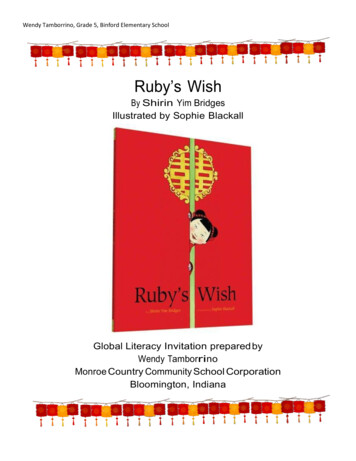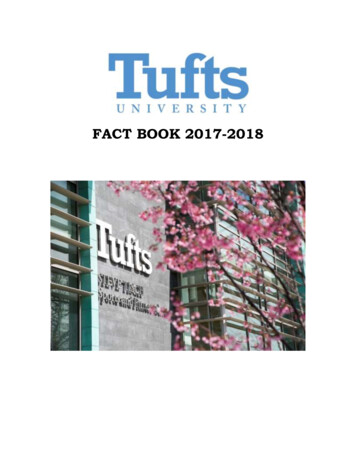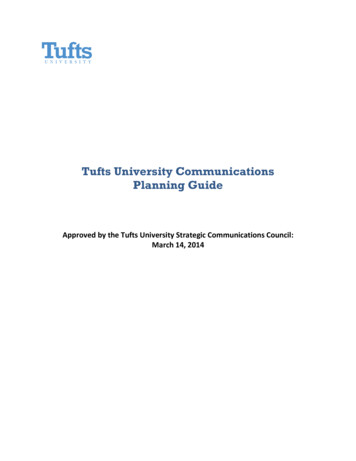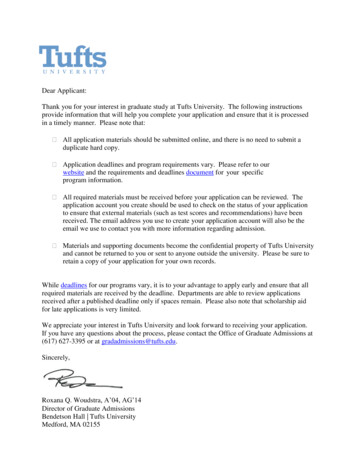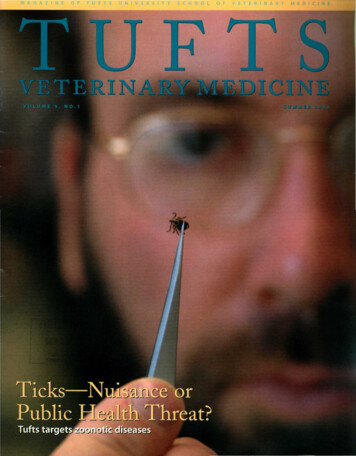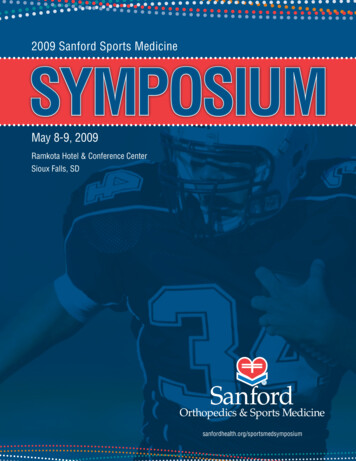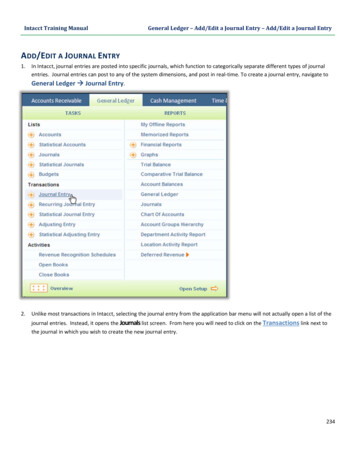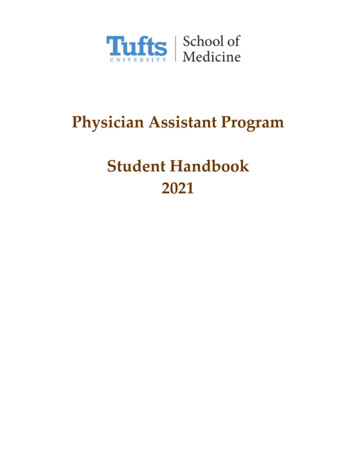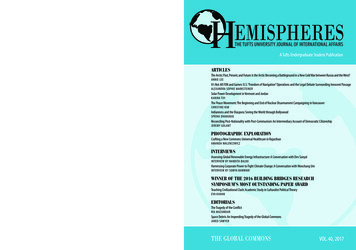
Transcription
EMISPHERESEMISPHERESTHE TUFTS UNIVERSITY JOURNAL OF INTERNATIONAL AFFAIRSA Tufts Undergraduate Student PublicationARTICLESThe Arctic: Past, Present, and Future: Is the Arctic Becoming a Battleground in a New Cold War between Russia and the West?ANNIE LEEIt’s Not All FON and Games: U.S.“Freedom of Navigation” Operations and the Legal Debate Surrounding Innocent PassageALEXANDRA SOPHIE MARKSTEINERSolar Power Development in Vermont and JordanKARINA TOYTHE GLOBAL COMMONSThe Peace Movement: The Beginning and End of Nuclear Disarmament Campaigning in VancouverCHRISTINE KIMIndianness and the Diaspora: Seeing the World through BollywoodSPRIHA DHANUKAEReconciling Post-Nationality with Post-Communism: An Intermediary Account of Democratic CitizenshipJEREMY GOLANTPHOTOGRAPHIC EXPLORATIONCrafting a New Commons: Universal Healthcare in RajasthanAMANDA WALENCEWICZINTERVIEWSAssessing Global Renewable Energy Infrastructure: A Conversation with Dev SanyalINTERVIEW BY NANDITA BALOOHarnessing Corporate Power to Fight Climate Change: A Conversation with Woochung UmINTERVIEW BY SOMYA BANWARIWINNER OF THE 2016 BUILDING BRIDGES RESEARCHSYMPOSIUM’S MOST OUTSTANDING PAPER AWARDEMISPHERESEVA KAHANVOL. 40, 2017Mayer Campus CenterTufts UniversityMedford, MA Teaching Civilizational Clash: Academic Study in Culturalist Political TheoryEDITORIALSThe Tragedy of the ConflictRIA MAZUMDARSpace Debris: An Impending Tragedy of the Global CommonsJARED SAWYERTHE GLOBAL COMMONSVOL. 40, 2017
HEMISPHERESTHE TUFTS UNIVERSITY UNDERGRADUATE JOURNAL OF INTERNATIONAL AFFAIRSHemispheres, The Tufts University Undergraduate Journal of InternationalAffairs, is the oldest academic publication of its kind. In 1975, under the direction of an energetic group of students that included Sashi Tharoor, the futureundersecretary-general of the United Nations, the Fletcher School of Law &Diplomacy at Tufts established the Fletcher Forum of World Affairs. Motivatedby the Fletcher Forum’s success, in 1977 students in the Tufts undergraduateprogram in International Relations established their own academic journal ofinternational affairs, and this year’s edition marks its 40th anniversary.Throughout its history, Hemispheres has remained committed to publishing research-length articles, photo-essays, and editorials of the highest academic caliber. The Journal has become a reflection of our changing world. Inthe 1970s, Hemispheres principally focused on Cold War issues, discussing thevalidity of neo-realist, bi-polar relations, and Realpolitik. In the spring 1978issue, renowned international affairs theorist Stanley Hoffman (Harvard)argued about the merits and failures of “Eurocommunism.” In the fall 1982edition, Kosta Tsipis (MIT) and Robert Pfaltzgraff (Tufts) debated optionsof “how to enhance American security and prevent a nuclear holocaust.” The1990s witnessed a redirection in Hemispheres’ aims, shifting away from a technical focus in favor of raising awareness within the Tufts community of contemporary international issues. Now nearing the end of the second decade ofthe twenty-first century, Hemispheres has shifted its role once again, this timeas a premier voice in undergraduate international affairs education, research,and debate. We are proud that Hemispheres is distributed both in print atmajor research libraries and online via EBSCO Host, a first for journals of itskind. It is an extraordinary time to be a part of this outstanding publication.
Benefactors & SupportHemispheres: The Tufts University Undergraduate Journal of International Affairs isproud to thank the following organizations and individuals for their support:The Tufts Community UnionThe Tufts Media Advisory BoardThe Program in International Affairs at Tufts UniversityThe graduated members of the Hemispheres CommunityBack IssuesBack issues of Hemispheres are currently being uploaded to our homepage:www.tuftshemispheres.org. Unfortunately, we do not have digitized, PDF versionsof issues prior to 2000.If a pre-2000 issue or article is required, please contact hemispheres@tufts.edu toreceive a scanned copy.SubscriptionsSubscriptions to Hemispheres: The Tufts University Undergraduate Journal ofInternational Affairs are welcomed. Hemispheres is free to members of the Tufts University community (inclusive ofthe Tufts University Medical affiliates). All subscriptions inquiries should be directed toward hemispheres@tufts.edu.Since its creation in 1976, Hemispheres: The Tufts University Undergraduate Journal of InternationalAffairs has been committed to publishing distinguished research produced by undergraduate students.The journal addresses a variety of social, economic, political, and legal issues, both contemporary andhistorical, within the framework of international relations. Selected through a double-blind peer reviewprocess, the articles contained in the journal reflect the diverse views of students from across the UnitedStates and around the world. The views and opinions expressed in the journal are solely those of individual authors and should not be regarded as reflecting any official opinion or position of Hemispheres,Tufts University, or its faculty.Mail correspondence should be addressed to:Hemispheres, Mayer Campus Center #52, Tufts University, Medford, MA 02155For further information about Hemispheres, please refer to our website atwww.tuftshemispheres.org.
HEMISPHERESTHE TUFTS UNIVERSITY UNDERGRADUATE JOURNAL OF INTERNATIONAL AFFAIRSEditors-in-ChiefNandita BalooArman SmigielskiManaging EditorsSomya BanwariJean-Charles ZurawickiPhoto EditorAmanda WalencewiczWeb EditorBryan PhamEvent CoordinatorSidd DivakaruniStaff EditorsIsaias Cardona-LopezHannah GouldMary GusentineRia MazumdarJared SawyerAnson SidleLIBRARY OF CONGRESS ISSN 0738-9825TUFTSHEMISPHERES.ORG HEMISPHERES@TUFTS.EDU
ContentsLetter from the Editors . . . . . . . . . . . . . . . . . . . . . . . . . . . . . . . . . . . . . . . . . . 1Nandita Baloo and Arman SmigielskiARTICLESThe Arctic: Past, Present, and Future: Is the Arctic Becoming aBattleground in a New Cold War between Russia and the West?. . . . . . . 5Annie LeeIt’s Not All FON and Games: U.S. “Freedom of Navigation”Operations and the Legal Debate Surrounding Innocent Passage. . . . . . 19Alexandra Sophie MarksteinerSolar Power Development in Vermont and Jordan. . . . . . . . . . . . . . . . . . 37Karina ToyThe Peace Movement: The Beginning and End of NuclearDisarmament Campaigning in Vancouver . . . . . . . . . . . . . . . . . . . . . . . . 57Christine KimIndianness and the Diaspora: Seeing the World through Bollywood. . . 75Spriha DhanukaeReconciling Post-Nationality with Post-Communism:An Intermediary Account of Democratic Citizenship . . . . . . . . . . . . . . . 93Jeremy GolantPHOTOGRAPHIC EXPLORATIONCrafting a New Commons: Universal Healthcare in Rajasthan. . . . . . . . 113Amanda WalencewiczINTERVIEWSAssessing Global Renewable Energy Infrastructure:A Conversation with Dev Sanyal . . . . . . . . . . . . . . . . . . . . . . . . . . . . . . . . 121Interview by Nandita BalooHarnessing Corporate Power to Fight Climate Change:A Conversation with Woochung Um. . . . . . . . . . . . . . . . . . . . . . . . . . . . . 127Interview by Somya Banwari
WINNER OF THE 2016 BUILDINGBRIDGES RESEARCH SYMPOSIUM’SMOST OUTSTANDING PAPER AWARDTeaching Civilizational Clash: Academic Study inCulturalist Political Theory . . . . . . . . . . . . . . . . . . . . . . . . . . . . . . . . . . . . 137Eva KahanEDITORIALSThe Tragedy of the Conflict . . . . . . . . . . . . . . . . . . . . . . . . . . . . . . . . . . . . 169Ria MazumdarSpace Debris: An Impending Tragedy of the Global Commons . . . . . . . 173Jared Sawyer
Letter from the EditorsInternational Relations discourse methods are traditionally top down, examining how states interact with each other, how policy decisions impact differentpeoples, and how international institutions operate. What is rarely focused onare the factors that underpin the decisions made by states, peoples, and otheractors. The 40th edition of Tufts Hemispheres attempts to analyze InternationalRelations from this bottom-up method. The Global Commons explores the wayin which tangible and intangible resources, norms, and institutions influenceactors, power dynamics, and traditional decision-making in the 21st century.To that end, this edition explores the dynamics of shared resources andcommons; whether the Arctic is becoming a new battleground, the legality ofFreedom of Navigation patrols by the U.S. Navy and other nation’s warships,and the security threats posed by Space Debris. The journal also touches on theenergy landscape and the differences in cultivation of renewables across theworld from Jordan to Vermont. Further, we had the honor of interviewing Mr.Dev Sanyal from BP and Mr. Woochung Wu from the ADB for their perspectiveson renewable energy, climate change, and sustainable development.Beyond tangible resources, we explore how ideas, norms, and institutionsspread and impact their surrounding communities. From themes of how theBollywood film industry has evolved and shaped the notion of “Indianness,” tothe ways in which democratization as an ideological force failed to account forthe contextual background of post-communist Europe, the journal exploresthe dynamic nature of our ideological commons today. We additionally examined the influence of ideologies that are no longer prevalent in our society; inour first ever transcription of a podcast, the journal explores the disappearance of nuclear disarmament campaigns in Vancouver and around the world.Our photographic exploration illustrates perspectives on how humanitarianresources, such as healthcare and international aid, are spread and challengespreventing their further proliferation.In our first ever collaboration with the Fletcher School’s Building BridgesResearch Symposium, this journal also includes the most outstanding paperfrom the symposium. It examines the intellectual commons of undergraduate education. The paper illustrates how Samuel Huntington’s “The Clash ofCivilizations” has influenced undergraduate academia.We hope that our journal will introduce the reader to a variety of newperspectives on how shared resources, both tangible and intangible, interactand shape the world around us. We’d like to thank our staff for their hardwork throughout the solicitation, review, selection, and editing process whilesimultaneously contributing to the Tufts community through the creation ofevents and panel discussions. It is due to their hard work that we were able toexplore such a multifaceted and robust theme.Nandita Baloo and Arman Smigielski1
Articles
The Arctic: Past, Present, and Future:Is the Arctic Becoming a Battleground in a NewCold War between Russia and the West?Annie Lee, The University of British ColumbiaAbstractThis paper aims to discuss the realities of Arctic politics as an evolution fromCold War rivalries to one of cooperation between Russia and the West—aseemingly unprecedented circumstance, especially given the heated tensions between the two in current international affairs. Thus, this paper arguesthat while there may be similar parallels in the Arctic to historical Cold Wardichotomy, current developments suggest otherwise, which can be attributed to a redefinition of security following the dissolution of the USSR, a newambition underlying modernization and militarization in the Arctic, andnewfound approaches to foreign policy by Russian governance. This papersuggests that using the perspective of Cold War politics to analyze the Arcticissue can impose limitations on international cooperation, and examines thepossibility of future evolution in Arctic regimes through a comparison withother international institutions.Understanding the Arctic’s SignificanceThe place of the Arctic in the international political and economic system is a central question for understanding the history, present andfuture of the Arctic . . . [It] has been a major theatre of military operations in the geopolitical competition between great and super powersduring World War Two and the Cold War. Today, the Arctic is muchshaped by the twin international political and economic systemicchanges of post-Cold War Russia-West relations and globalization.1Historically, the Arctic has played a vital role in Russian-Western exchangesdue to its strategic location and favourable ice conditions, and subsequentlywas an area of major focus both for Russian and NATO forces. Today, the Arctic serves as an area on the brink of possibility, hovering between the potentialto become once again an arena for Russian opposition against the West, or tobecome a new realm for international cooperation.Following the end of the Cold War, Russia has striven to regain its global status, revised under the acknowledgement that it does not have the capacity to bean opposing force to the United States as it once was—instead, Russia has opted5
6H E M I S P H E R E S : The Global Commons vol. 40, 2017for a pragmatic approach by preventing further American domination whereverpossible.2 Following the dissolution of the USSR, Russia under Boris Yeltsin sawa decline in Russia’s global status and a destabilization of its domestic sphere—thus under the subsequent governance of Vladimir Putin and Dmitry Medvedev,policies have centered around rebuilding and re-establishing Russia as a worldpower with a focus on self-dependence, primarily in regards to energy security,a sector which has propelled Russia’s economic growth. This response to thenew world order has occurred with a new pragmatism and intense pursuanceof national interests, as Russian foreign policy coming into the twenty-first century has been characterized by a lack of an ideological anchor and an aggressivefocus on national security and national interest, coupled with a revived opposition between Russia and Western nations.3What this narrative can suggest is a new Cold War thesis, supported bycurrent Russian actions that are cause for alarm among the internationalcommunity, such as the authoritarian management of its economy, Russianaggression toward other sovereign states, and the suppression of civil andpolitical freedoms in Russia. However, while many of Russia’s involvementson the international stage have received condemnations from Western countries, current Arctic politics appears disengaged from this.4 That is to say,while the Arctic has elements of a familiar dichotomy between Russia andthe West, there are also unprecedented illustrations of international cooperation—thus, this paper will argue that while there are traces of Arctic politicsthat evoke memories of the Cold War, the reality of Russian cooperation andrespect for international law challenges this perspective, and hints at a moreextraordinary future in the Arctic.Antagonistic Russia in the ArcticIn the international community, Russia is often regarded as a “wild card,” withmistrust from the international community stemming from a variety of Russian actions, such as its annexation of Crimea—actions that can be interpretedas Russia’s willingness to insistently pursue national interests, even by meansof aggression.5, 6 In the Arctic, incidents such as Artur Chilingarov planting aflag in the North Pole in August 2007 have incited international suspicionsof Russian intentions in the Arctic, fuelling exaggerated speculations of animpending resource race and piquing global dialogue on issues of territoryand sovereignty. Similarly, Russian strategic bomber flights along the Pacificand the Norwegian coast in 2007 were regarded as actions of antagonism, raising questions on whether Russia was aiming to establish itself once again as anaval power in the Arctic region.Russia’s return to its Cold War stance was evident with Putin’s tightening of Kremlin control over domestic affairs—which weakened Russia’sfragile budding democracy and was subsequently criticized by the West—thus, impacting the way Russian foreign policies have been received andcontributing to further doubts and suspicions of Russian intentions on the
The Arctic: Past, Present, and Future Lee7international stage.7 Russian foreign policies after the USSR have provokedfears of a renewed desire for Russian hegemony, as Putin’s governance hasemulated many of the USSR’s statist traditions—in particular, Russia’s Arcticpolicy has been described as “realpolitik with a Stalinist flavour,” suggestinga potential return to Cold War politics.8 Russia’s presence in the Arctic carries echoes of its Cold War past—for example, there are similarities given thegeographical and strategic importance of the Barents Sea and its surroundingarea in Russia’s nuclear deterrence strategies, but there is also a new dimension of this subject to consider: the importance of energy.Russia and the Arctic: A New Definition of SecurityThe Arctic is integral both to the material and immaterial existence of Russia—it is a part of its national psyche and identity, as well as its sustenance.The Russians have continually identified as a Northern population, but moreimportantly, they have viewed their nation as a powerful one, propelled by arobust energy economy—hence, the Arctic represents an area where Russianleaders can “bolster Russia’s image as a great power, a global energy players anda strong national prepared to defend its sovereign interests.”9 Russia views theArctic as a vessel to reinstate national identity, while intertwining and supporting elements of national security, energy security, and economic security. Theimportance of energy resources in the Arctic have endowed Russia with botheconomic and political influence, and Russia’s “ability to harness [its] assetsand translate [their] riches into continuous economic growth have affordedits political leadership greater freedom in conducting foreign relations [and]energy exports have become a key pillar of Russian foreign policy.”10Russia’s 2009 and 2015 national security strategies both emphasize therole of energy in strengthening Russia’s influence and status on the international stage.11 The linking of energy and national security means that Kremlin tends to regard any obstacles to obtaining access to energy resources asa threat to its energy wealth, and consequently, a threat to Russian security.12 Russia is heavily invested in the Arctic region, as the U.S. GeographicalSurvey of 2008 estimated that 30% of the world’s undiscovered reserves ofnatural gas and 13% of the world’s undiscovered reserves of oil are withinthe limits of the Arctic Circle. Areas like the Shtokman fields in the BarentsSea, which hold an estimated 3.7 trillion cubic metres of gas and 31 millionmetric tonnes of gas condensate, further fuel Russia’s investment in the Arctic13—not to mention the fact that 90% of Russian hydrocarbon reserves inthe Russian continental shelf are located in the Arctic, mainly in the Barentsand Kara Seas.14 “Russia’s Energy Strategy for Russia up to 2020” formalizedRussia’s focus on the Barents Sea, Kara Sea, and Yamal Peninsula as key pillars in the Russian energy sector in an effort to sustain and propel economicgrowth,15 and “Russia’s Energy Strategy for the period up until 2030” alsoarticulated a focus of state policy on the exploration and development ofterritories and waters in the Arctic, aiming to develop and maintain gas andpetroleum activities in the region.16
8H E M I S P H E R E S : The Global Commons vol. 40, 2017An area of the Arctic that holds profound significance in the Russian pastand present is the Northern Sea Route. Historically, Russia had its militaryfleets scattered throughout the Barents Sea, the Baltic Sea, the Black Sea,and the Sea of Japan—a feature that played a role in colossal defeats in Tsushima in 1905 at the hands of the Japanese, and at the ports of Murmansk andArkhangelsk during WWII at the hands of the Germans.17 While the NorthernSea Route is less important in its military strategic significance today, it hasenormous potential to elevate Russia’s economic growth—not through energyexports, but through an expansion of Russia’s role in global networks. In particular, the port of Murmansk is vital in this route because it is relatively icefree and links the North Atlantic with the Barents Sea, hence the developmentof the Northern Sea Route could lead to a staggering increase in maritimetraffic as trade links between Europe and Asia intensify. Thus, the Arctic is aregion where Russia can not only increase its economic activity, but also itsparticipation in the international economy.The Arctic: A Zone of MilitarizationDuring the 1990s, Russian military presence diminished in the Arctic as thegovernment focused its resources on the Chechen War. However, as the Arcticbecame a prominent issue on the international agenda and an integral aspectof Russia’s energy sector, there was renewed interest in the region.18 Due to theredefinition of security and the incorporation of the energy dimension intothe former, the Arctic, which was once considered vital to nuclear deterrence,is now less a region of military importance, and more a region with a focus onindustrial and economic activity. However, this does not mean that the Arcticis devoid of military characteristics—in fact, the opposite is true.One of the most important positions is the Barents Sea, which was once anarea of tension due to the cache of Soviet nuclear submarines located there—now, it is a key domain in the Russian oil and gas industry, as well as an accesspoint between the North Atlantic and Arctic Oceans. Thus, it can be garneredthat the revived importance of strategic areas in the Arctic, now in an economic sense rather than military, offers a narrative that reverberates with ColdWar parallels, as this revitalized emphasis is coupled with modernization anddevelopment of military strength. The Arctic is still considered by Russia tobe a key operational area in terms of military strategy due to a lack of access tothe Baltic and Black Seas as a result of geopolitical changes, and is a powerfulbase for the Northern Fleet and the naval component of the Russian nucleartriad.19 For example, in 2011, 67% of Russia’s 567 sea-based nuclear warheadswere operating from the Kola Peninsula, where the Northern Fleet is based,and the rest of the ballistic missile nuclear submarines were found on thePacific Fleet on the Kamchatka Peninsula, which frequently voyage throughArctic waters.20 However, it is essential to distinguish Russian militarizationin the present from the past—Russia’s current actions are still militaristic,but they are not explicitly designed for Western opposition and are intrinsically defensive. As Russia regards the Arctic as a primary resource base and a
The Arctic: Past, Present, and Future Lee9primary corridor for future trade and shipping traffic, it is expected that Russia believes in a strong and sustained military presence to defend its nationalinterests—especially its energy resources.Russia’s 2008 Arctic Strategy21 was designed by the Russian SecurityCouncil and reflected Russia’s approach to the Arctic—focusing on particular interests and ambitions in lieu of adopting a consistent, overarching, andmethodological strategy.22 This strategy highlighted Russia’s willingness toprotect its national interests, and by extension, its energy resources, as itmentions that one of the main goals of Russian policy in the Arctic was toprovide “military security, defense and border protection [and] create groupings of Russian Army general purpose troops (forces) as well as other troopsand military units and organs . . . capable of providing military security inthe [Russian] Arctic zone.”23 In early 2010, Dmitri Medvedev also explicitlyemphasized a willingness to use military means to secure Russian nationalinterests, stating that Russia’s intention to secure their “top strategic resourcebase”24 in the Arctic could necessitate military force in addressing conflicts.25Russia’s national security strategy of 2009 further reiterated the possibility ofusing military force to address emerging issues, especially when faced withthreats to vital resources.26 This was evidenced by Russia’s rearmament plansof 2011, which vastly overshadowed the plans of the other Arctic nations—Russia declared it would spend 22 trillion rubles on modern weaponry, aiming for the purchases of 20 new nuclear submarines, 80 naval surface vessels,600 warplanes, 1000 new helicopters, and new S-400 and S-500 air defensesystems by 2020.27 This ambitious plan was restrained by global economic crises, and thus the pace of modernization of Russia’s military in the Arctic hasbeen slow, though the “radical characteristic of military reforms being implemented aimed at moving away from a mass mobilization army to a permanentreadiness brigade model, [revealing] a new quality in the Russian approach,”28where Russia seems to be ready to respond, but not to instigate any conflict.Russia’s efforts to expand its capabilities in the Arctic have caused alarm inregards to a “technological arms race” against the West, with officials such asAdmiral Haakon Bruun-Hanssen, Norway’s chief of defense, explicitly drawing comparisons to the Cold War.29Despite the alarming militaristic ambitions of Russia, one factor to consider is that Russia still maintains its desire to influence and balance Western powers. One of Russia’s aims in its foreign policy is to limit the influenceof NATO, as NATO continually regards the High North as an area of strategic concern, thus fuelling Russia’s desire to maintain military strength inthis region as a defensive mechanism.30 Given Russia’s current presence in theArctic, one can say that this objective has been achieved as Russia is the mostpopulated power in the Arctic, possesses the only fully-fledged naval fleet,the largest ice-breaking fleet, and holds the largest ice-free port city, therebyoffering a challenge to the western dominance.31 Thus, as the Arctic is an areawhich Russia has the capacity to, and does quite effectively, project its militarypower as a defensive and pragmatic response to the West, Russian strategies
10H E M I S P H E R E S : The Global Commons vol. 40, 2017to consolidate its image as a leading Arctic player are relatively successful—lending to perceptions of a new Cold War. However, if one detaches ColdWar assessments of Russian-Western relations from Arctic politics, evidencepoints in the opposite direction.Realities of CooperationRussia’s Relationship with International LawWhile Russia may be very vocal about its willingness to use aggression todefend its national security, implying engagement against Western nationsif necessary to defend vital interests, Russia has demonstrated a commitmentto international cooperation and negotiations with its Arctic neighbours.For example, Russia concluded a bilateral negotiation with Norway over thedelimitation of a maritime boundary in the Barents Sea in 2010.32 It is important to highlight the fact that Russia’s 2008 Arctic Strategy not only expresslyconfirmed Russia’s investment in the Arctic region as a strategic resourcebase and a link between Russian petroleum exports to European and Asianmarkets, but also affirmed Russia’s belief that the Arctic was to be a “zone ofcooperation.”33 The document articulated Russia’s willingness to work withinthe framework of regional and international institutions and willingness tocomply with the norms and principles of such institutions, reflecting a newpragmatism and understanding of the new global order by the Russian leadership following the end of the Cold War.34Russia’s willingness to abide by principles of international law and commitment to international cooperation had been long established before thepublication of this document—Mikhail Gorbachev, in his speech at Murmansk, first called for Arctic peace and cooperation in 1987, thus laying theframework for what is now Arctic Council.35, 36 Similar collaborative vocabulary was used by Vladimir Putin in 2010 at a speech at the Arctic forum, wherehe stated that “[Russia believed] that preserving the Arctic as a zone of peaceand cooperation [was] of the utmost importance,”37 where “no single problem[in the Arctic could not] be solved cooperatively based upon common senseand solid foundation of international law” in the Arctic.38 In 2013, Russia’sForeign Policy Concept once again articulated Russia’s desire to strengthen itseconomic status in the global system through international and regional organizations, thus it can be seen that Russia’s official rhetoric on Arctic politicsfollows a trajectory of respect for international law.39 Russia’s dedication tointernational law, international institutions, and multilateral decision-making processes is also a very logical position—as the legal successor of the dissolved USSR, Russia inherited a position of tremendous power in the UnitedNations Security Council, thus “unsurprisingly, a stated goal of Russian foreign policy has long been to empower the UN and thereby its own role withinit”40—and abiding by international principles can not only strengthen the roleof international law, but also improve Russia’s position on the global stage.
The Arctic: Past, Present, and Future Lee11Thus, while there may be tensions between Russia and the West in otherinternational matters, Russia in the Arctic should not be judged based onexternal incidents, as Russia has consistently acted as an abiding member ofthe international community in Arctic matters. While Russia is still not fullytrustful of NATO’s interest in the Arctic region and is reluctant to expand theArctic institutions to include more members of the international community,Russia’s focus on international cooperation should not be discounted.41 Defensive actions by Russia in the Arctic, in regards to military modernization andvoiced ag
www.tuftshemispheres.org. Unfortunately, we do not have digitized, PDF versions of issues prior to 2000. If a pre-2000 issue or article is required, please contact hemispheres@tufts.edu to receive a scanned copy. Subscriptions Subscriptions to Hemispheres: The Tufts University Undergraduate Journal of International Affairs are welcomed.

